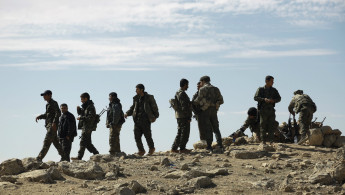Thousands flee Raqqa as Turkish-Kurdish tensions threaten anti-IS campaign
Local media reported on Thursday that 3,000 people had arrived in Ain Issa, a town within the Tell Abyad district of Raqqa governorate located around 60 km north of the city of Raqqa in the previous 24 hours, following on from previous displacements in the last week.
Kurdish forces captured Ain Issa from IS in July 2015 and in recent weeks began a campaign to liberate the city lead by the Washington-backed Syrian Democratic Forces (SDF), pushing from the town and Suluk north of Raqqa under the cover of airstrikes conducted by the US-led international coalition.
No current humanitarian access
Speaking to The New Arab, Firas al-Khateeb, communications officer with UNHCR in Syria, said that the organisation did “not have a presence on the ground” in Ain Issa to assess the situation for displaced civilians there, many of whom had previously been living under the austere rule of IS.
“The area has not witnessed heavy clashes so we hope they are safer there,” said al-Khateeb. “We have no access at the moment but we are developing a comprehensive plan of action for the area which should begin to come into place in the next two, or three days."
Syrian Democratic Forces currently marching on Raqqa include Kurdish, Arab, Syriac, and Turkmen fighters with around 30,000 fighters said to be taking part in the Raqqa offensive.
Turkish threats to Kurdish Raqqa offensive?
The assault comes at a time when Iraqi forces are battling Islamic State militants encamped in the Iraqi city of Mosul, where aid groups have expressed concern about the wellbeing of civilians displaced from the city, and those who remain trapped.
In Syria, SDF advances on Raqqa face possible derailment.
On Thursday, following claims that Turkish artillery shelling near Manbij in Aleppo province had resulted in civilian casualties, the SDF released a statement expressing a willingness to fight alongside Manbij’s Miltary Council against Turkish “aggression” in northern Syria.
In August Turkey began a military campaign dubbed “Euphrates Shield” in Syria involving both Ankara-backed Syrian rebels and Turkish ground troops.
Ostensibly focused on combating the threat of the Islamic State, Turkey’s intervention is also aimed at preventing Syrian Kurdish Forces joining up territories accumulated over the course of Syria’s civil war along Syria’s northern border with Turkey.
In a statement issued on Thursday, the SDF claimed that Ankara's intervention against the Islamic State in Syria constituted a smoke screen with which to attack Kurdish forces.
“Turkey directly occupies Syrian land in northern Aleppo with the claim of fighting terrorism. Their fight has been a theater of surrendering and capturing ground from Daesh terrorists," read the statement,"... But it turns out their primary goal was to occupy areas the Manbij Military Council (MMC) had already liberated from Daesh (IS)."
In a statement earlier in the week, the SDF said it had informed the US-lead international coalition battling IS that it would halt operations on Raqqa if Turkish-backed forces did not stop attacks on Manbij.
Turkish President Recep Tayyip Erdogan has expressed anger at Washington’s decision to back Kurdish forces in Syria that Ankara views analogous to the Kurdistan Workers Party which has waged a guerrilla war against the Turkish state since the 1980s.
Currently the Turkey-backed Euphrates Shield is focusing efforts on the IS-held city of al-Bab, sustaining casualties in the process, with the aim of securing the city and proceeding to Manbij, located around 100km west of Ain Issa in Aleppo province, where Kurdish troops remain positioned.





 Follow the Middle East's top stories in English at The New Arab on Google News
Follow the Middle East's top stories in English at The New Arab on Google News
![Israeli forces ordered bombed Gaza's Jabalia, ordering residents to leave [Getty]](/sites/default/files/styles/image_330x185/public/2176418030.jpeg?h=a5f2f23a&itok=_YGZaP1z)

